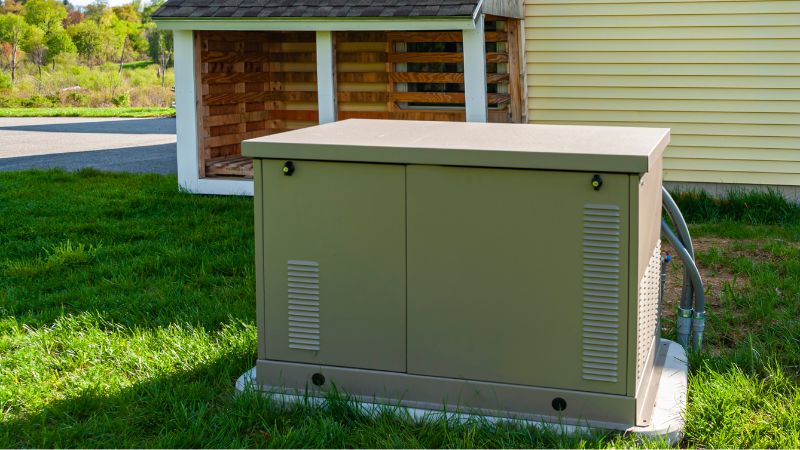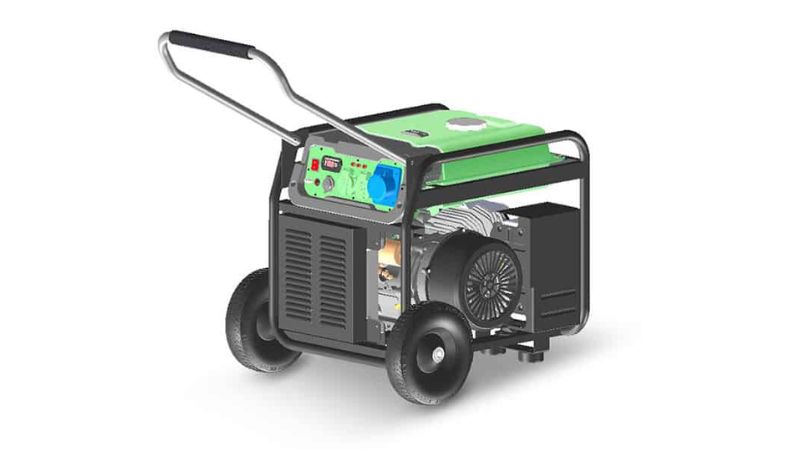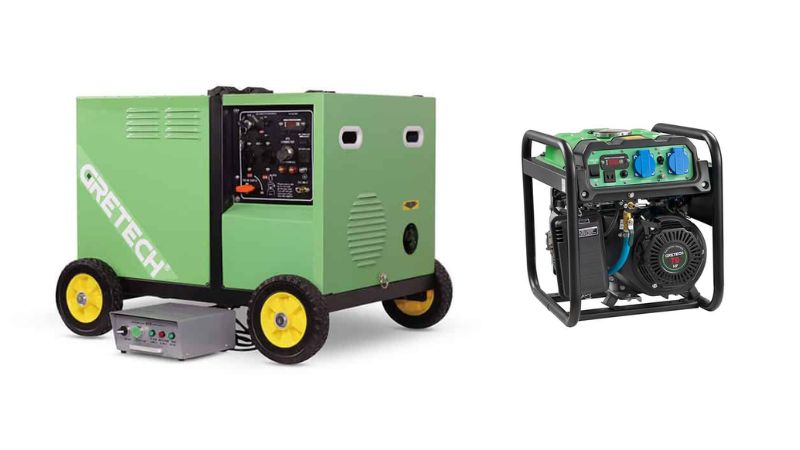
What is the single greatest fear during a prolonged power outage? For many, it’s not the darkness or the quiet—it’s the terrifying moment the generator might die. That fear is rooted in one critical unknown: fuel runtime.
Unlike filling a car with gas once a week, your generator’s fuel supply is your entire reservoir of electricity. If your backup plan involves propane, knowing the answer to “how long will a generator run on propane?” is what separates a temporary inconvenience from a genuine crisis. This guide will walk you through typical propane generator runtimes, the key factors that determine how long your generator can run, and even how to calculate your exact needs.
Typical Propane Generator Runtimes
It’s helpful to start with some general scenarios. Runtimes vary significantly between a small portable generator and a whole-house standby generator.

- Portable Generators: A typical mid-sized portable generator model might have a 20-pound propane tank (like a standard BBQ grill tank). On a half-load, powering a few essential appliances like a refrigerator and some lights, you could expect a runtime of about 10 to 20 hours. At a full load, this could drop to as little as 5-10 hours.
- Standby Generators: These are the permanently installed units that automatically kick in during a power outage. They are connected to a much larger fuel source. A standby generator can run continuously for days or even weeks. For example, a well-sized unit connected to a full 500-gallon propane tank might run for about 5 to 10 days without needing a refill.
These numbers are just estimates. To get a true picture of your home, we need to look at the factors that directly impact propane consumption.
The Key Factors That Determine Your Runtime
Think of your generator’s runtime like your car’s fuel economy. Just as a car uses more gas when driving uphill at high speed, a generator uses more propane under certain conditions. Here are several factors that control how long you’ll have power:
Generator Size
Think of this as the engine size. A larger, more powerful generator (measured in kilowatts or kW) has a bigger engine that naturally consumes more fuel, even when running the same appliances as a smaller model. It’s the difference between a pickup truck and a sedan—the larger vehicle simply uses more fuel by design.
The Electrical Load (Power Demand)
This is the single biggest factor you control. Your generator’s fuel consumption is directly tied to the work it’s actually doing.
- Light Load: Powering essentials like a refrigerator, lights, and phone chargers uses less fuel.
- Heavy Load: Adding energy-hungry appliances like central air conditioning, a water heater, or an electric stove forces the generator to work much harder, consuming propane significantly faster.
The Size of Your Propane Tank

This is your fuel reservoir. The math is simple: a larger tank means a longer potential runtime. A small portable tank may only last a few hours, while a large stationary tank can power a home for days. Your propane supply is the ultimate limit on your generator’s operation.
Generator Efficiency
Modern models, especially inverter generators, are designed for superior fuel efficiency. They can intelligently adjust their engine speed to match the electrical demand, rather than running at a constant high speed. This “smart” operation drastically reduces fuel consumption and extends runtime. Additionally, propane itself burns cleaner than gasoline, which can help maintain engine efficiency over time.
How to Calculate Your Exact Runtime
While your generator’s manual provides general estimates, you can calculate a more precise runtime for your specific situation with a simple formula. This allows you to manage your fuel supply confidently during an outage.
Follow these two steps:
Step 1: Determine Your Fuel Consumption Rate
First, you need to know how much propane your generator uses per hour. The most accurate place to find this is in your generator’s manual, where it’s typically listed as “gallons per hour” (GPH) at half-load and full-load.
Can’t find the manual? A common rule of thumb is that a home standby generator uses 2 to 3 gallons of propane per hour under a full load.
Step 2: Apply the Runtime Formula
Once you have your fuel consumption rate, use this formula:
Usable Fuel (gallons) ÷ Consumption Rate (gallons/hour) = Total Runtime (hours)
Example Calculation:
- You have a 500-gallon propane tank (but it’s only safe to fill to 80%, so you have 400 gallons of usable fuel).
- Your generator running at full load consumes 2.5 gallons per hour.
- Calculation: 400 gallons ÷ 2.5 gallons/hour = 160 hours of runtime.
- 160 hours equals about 6.7 days of continuous use.
Important Note: For this calculation to be accurate, you must first add up the wattage of all the appliances you plan to run simultaneously. This total “power demand” will tell you whether your generator is operating at a half-load, full-load, or another level, which directly affects its fuel consumption rate.
Propane vs. Gasoline: Which Runs Longer?
When comparing fuel types, many people wonder if propane or gasoline will give them a longer run time.
- Energy Content: Gasoline contains more energy per gallon than propane. In theory, one gallon of gasoline will run a generator longer than one gallon of propane.
- Shelf Life: This is where propane often wins the practicality battle. Gasoline degrades quickly, going stale in just a few months, which can damage the generator. Propane, on the other hand, has an indefinite shelf life. You can store a large propane tank for years without worry.
- Storage: A standby generator hooked to a large tank means you won’t have to worry about refueling in the middle of a storm. With gasoline, you’d need to store large, unsafe quantities or venture out during an outage to find more.
- Operation: Propane burns cleaner than gasoline, resulting in fewer emissions, less engine wear, and a reduced risk of carbon monoxide buildup.
While gasoline wins on pure energy density, propane’s superior shelf life, safety, and the ability to maintain a large, stable fuel supply often result in a longer and far more reliable runtime during an extended outage.
Frequently Asked Questions
Can a propane generator run indefinitely?
Yes, but only under one condition: if it has a continuous fuel supply. A standby generator connected to a buried 500-gallon propane tank or a natural gas line can run indefinitely as long as the fuel lasts or the gas lines are active. Portable generators are limited by their small tank size.
How often does a propane generator need maintenance?
Like any engine, regular maintenance is key to reliability and efficiency. This includes checking spark plugs, air filters, and, crucially, oil changes. Most manufacturers recommend an oil change after every 50-100 hours of operation (often noted as around 200 hours). Always follow your specific generator’s manual.
How do I choose the right generator size?
The right generator for you depends entirely on what you need to run. Make a list of your essential appliances (sump pump, refrigerator, furnace, well pump) and add up their starting and running watts. This total power demand will guide you to the correct generator size. A professional can help with this calculation.
Are there any safety concerns with running a generator for days?
Yes. Carbon monoxide is a silent, deadly risk. Never run a generator indoors or in an enclosed space like a garage. Ensure it’s placed far from windows and doors. For extended use, installing a battery-operated CO alarm is a lifesaving precaution.
Conclusion
So, how long will a generator run on propane? As we’ve seen, the answer is a firm “it depends.” It depends on the type of generator you have, the amount of propane in your larger tank, and the power demand you place on it.
By understanding the several factors like fuel type, generator size, and electrical load, you can move from guessing to knowing. Calculate your home’s specific needs, choose the right generator, and maintain a robust fuel supply. Taking these steps ensures that when the lights go out, your peace of mind stays on.
